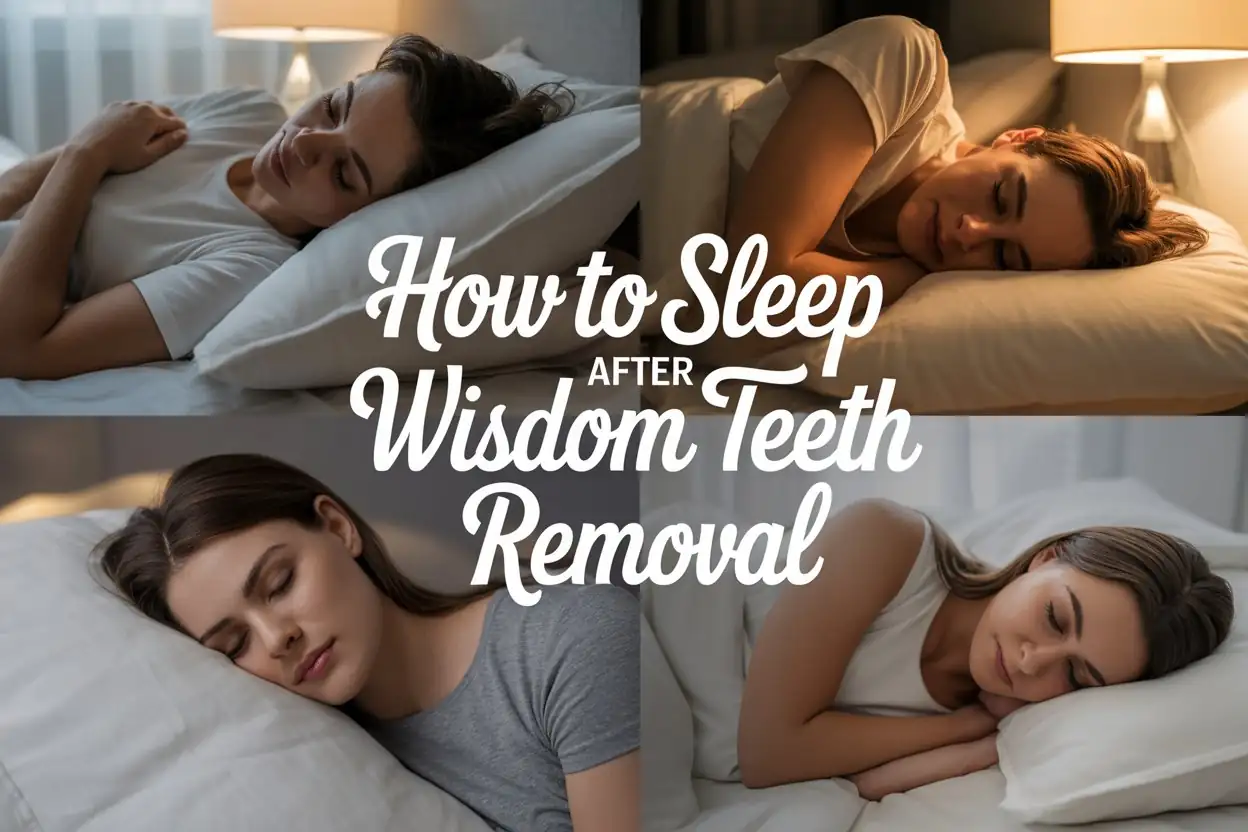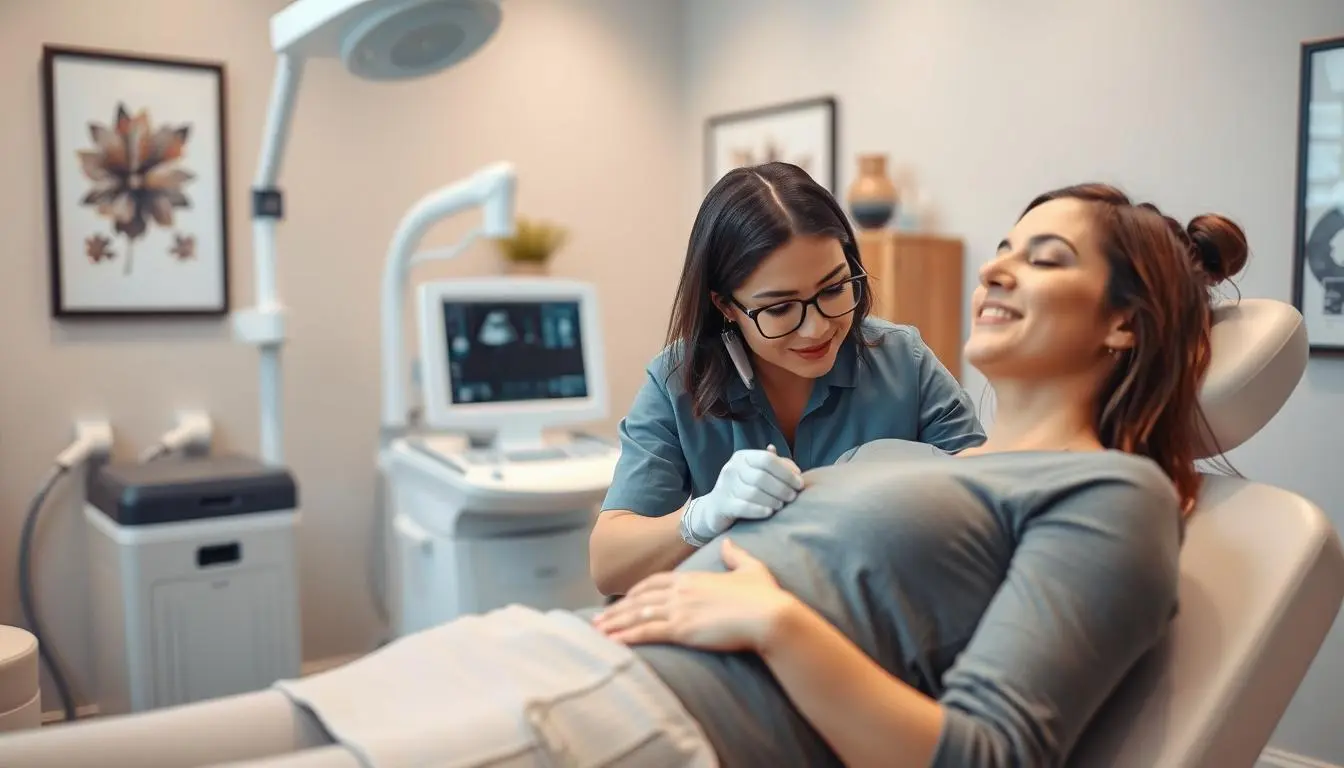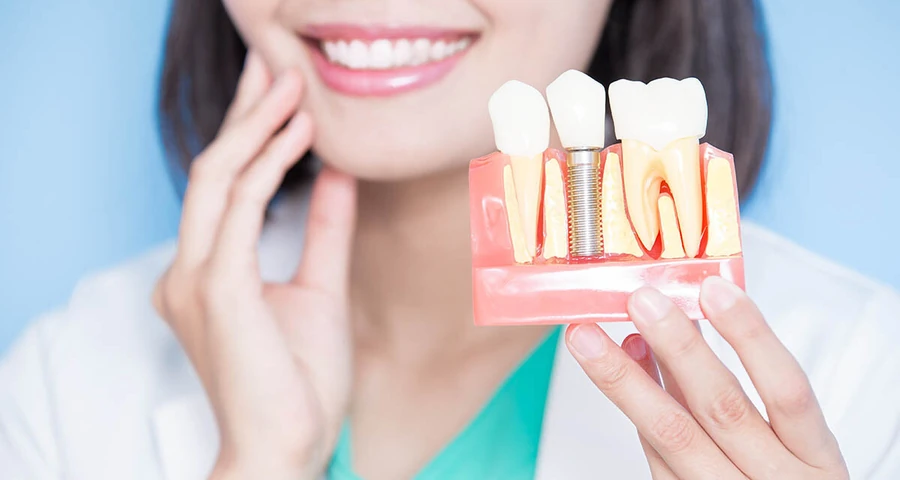The procedure’s over, the numbness is wearing off, and now it’s nighttime, which somehow feels harder than the surgery itself.
And yeah, it feels weird to stress about something as basic as sleeping — but that’s exactly what happens and how to sleep after wisdom teeth removal. You close your eyes, and suddenly you’re aware of every dull ache, every tight throb in your jaw.
So if you’re wondering how to sleep after wisdom teeth removal, you’re not alone. This guide walks you through it — the realistic stuff, not just the generic aftercare instructions your dentist printed out. From what not to eat at night to sleeping positions that actually help, we’ll cover the small things that make a big difference during recovery.
Whether your procedure was with sedation or just local numbing, your nights can feel like the hardest part of the healing process, especially early on. But with a few adjustments, you can set yourself up for what your body needs most: real, rejuvenating sleep.
I. Why Sleeping Is Hard After Wisdom Teeth Removal

There’s a reason no one really tells you how to sleep after wisdom teeth removal — because it’s kind of a mess. You might think you’ll just pass out from the anesthesia or pain meds… but the reality? It’s not that simple.
Pain tends to creep up at night. That dull jaw pain you ignored during the day starts throbbing once you’re horizontal. Swelling around your cheeks can also feel worse when you’re still, thanks to gravity.
Then there’s the grogginess. If you were under oral sedation, you might feel disoriented or even jittery the first night. It’s a weird combo — your body’s exhausted, but your mind might feel weird or just… uncomfortable.
Even if your oral surgeon gave you detailed postoperative instructions, they probably didn’t go deep on sleep. It’s one thing to manage the healing process during the day — another thing entirely when you’re lying in the dark, trying not to disturb your blood clot or surgical site.
II. Do Sleep Elevate the First Few Nights
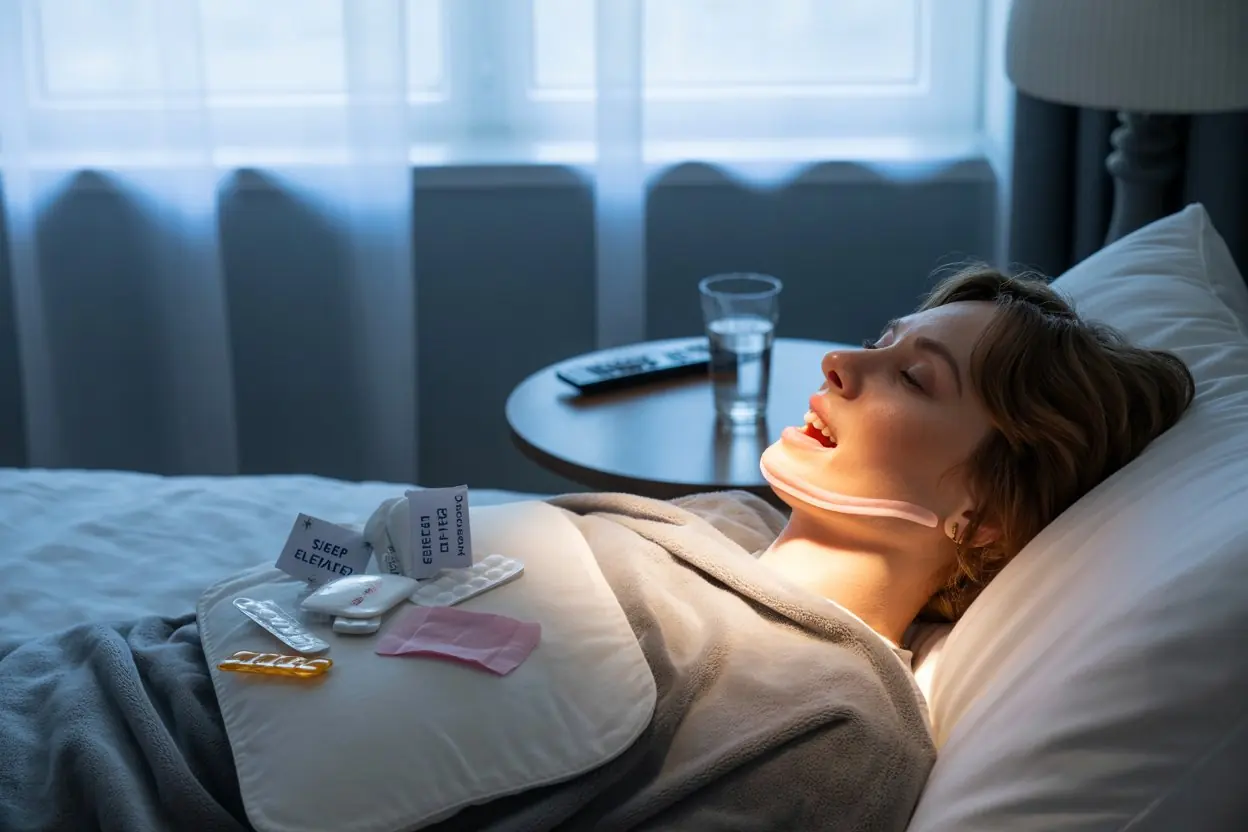
One of the simplest (and most underrated) things you can do to improve how to sleep after wisdom teeth removal is to keep your head elevated — at least for the first 3–5 nights. Not dramatically high, just about a 45-degree angle. Think “propped up like you’re binge-watching Netflix,” not “sitting bolt upright.”
Why it helps:
- Reduces facial swelling by limiting blood flow to the surgical site
- Keeps blood clots stable by avoiding pooling pressure
- Helps prevent that awful “face feels like it’s pulsing” sensation
- Can make pain medication work more effectively while you rest
Some people swear by a wedge pillow, while others stack 2–3 firm pillows behind their upper back. And honestly? If you have a recliner, that might be the most comfortable option, especially if you’re dealing with jaw pain or neck stiffness.
✅ Pro Tip: Can’t get comfy? Try placing a rolled towel under your knees. It takes pressure off your lower back and helps your whole body relax into a supported position — which really does make it easier to fall asleep (and stay asleep).
III. Don’t Avoid Sleeping on Your Side
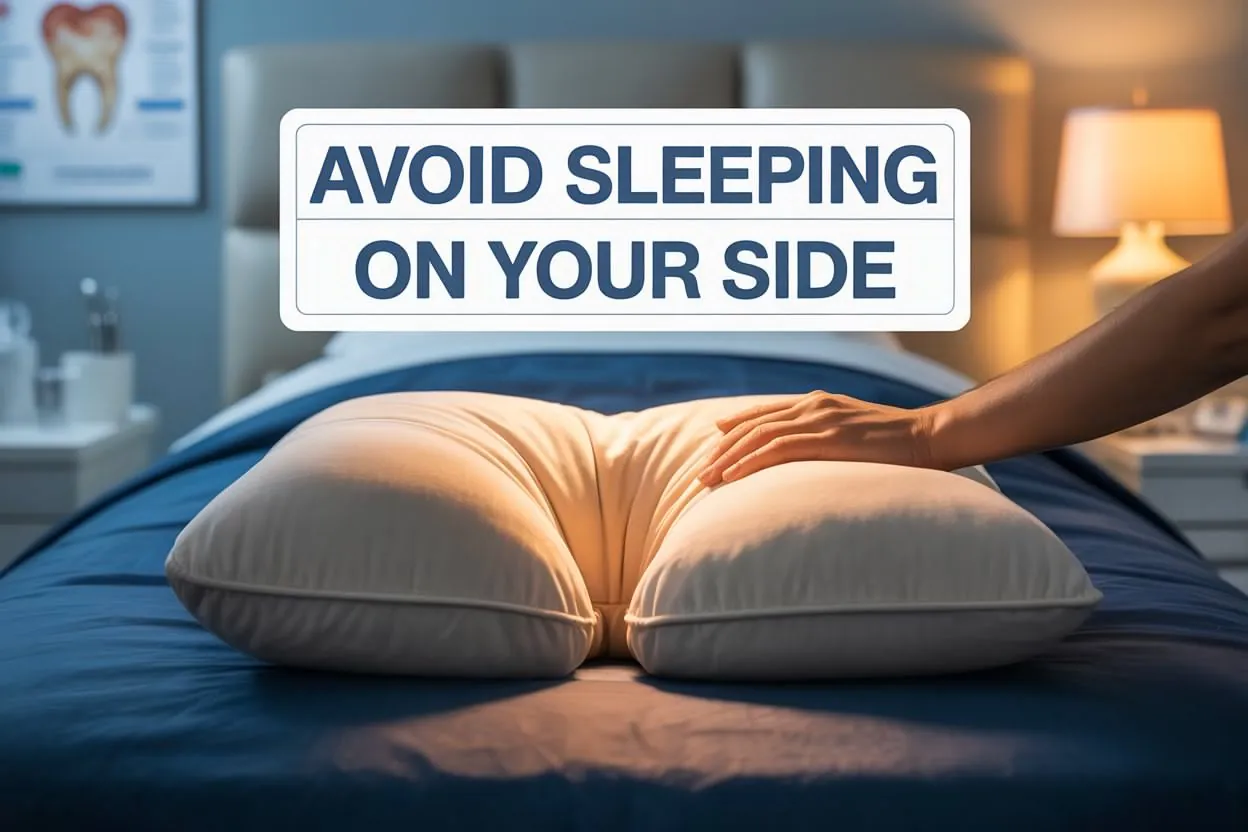
We get it — side sleeping is comforting. It’s probably your go-to. But after remove wisdom teeth, it’s better to skip it for a few nights. Here’s why.
Why Side Sleeping Can Backfire:
- Compresses your cheek, which increases inflammation and discomfort
- May cause blood flow imbalance, making one side swell more
- If you turn in your sleep, it could shift pressure to the incision site or disturb the blood clotting process
Plus, there’s always that risk you’ll accidentally roll onto the surgical side — especially if you had third molars removed on both sides. That could mean waking up with sharp tooth pain, or worse, signs of dry sockets starting to form. Not fun.
❓Can I sleep on my side after wisdom teeth surgery?
Eventually, yes. But wait until your oral care team gives the green light — usually once the swelling’s gone down and postoperative instructions say it’s okay.
IV. Do Stick to a Nighttime Routine (Even If You’re Tired)
Let’s be real — the last thing you probably feel like doing after oral surgery is following a bedtime routine. But weirdly enough, a few calming habits can help ease discomfort and make it easier to actually drift off.
Here’s a short routine that supports healing, how to sleep after wisdom teeth removal:
| Time | Action | Why It Helps |
| 30 mins before bed | Take your prescribed pain meds | Keeps you ahead of the pain curve |
| 20 minutes before bed | Gently brush your teeth (avoiding the treatment site) | Keeps oral health in check and prevents infection |
| 15 minutes before bed | Do a light walk or gentle stretch | Improves blood flow and reduces stiffness |
| 10 minutes before bed | Rinse with warm salt water (if 24+ hours post-op) | Aids healing at the surgical site |
| 5 minutes before bed | Dim lights, reduce screen time | Signals your brain that it’s time to sleep |
A little structure helps. Even just taking 10 minutes to slow down can calm the nervous system, especially when you’re still adjusting to pain medicines or sedation recovery.
💤 Pro Tip: Try herbal tea (caffeine-free) or soft nutritional supplement drinks if you’re hungry at bedtime. Just avoid straws — they can interfere with blood clot formation.
V. Don’t Skip Your Medication Schedule
This one’s simple: If you wait until the pain kicks in, you’ve waited too long.
Many people make the mistake of thinking they can “tough it out” at night it help with wisdom teeth — especially once the anesthesia wears off. But nighttime pain from dental surgery can feel sharper, more persistent, and a lot more sleep-disrupting than expected. So, how to sleep after wisdom teeth removal?
Here’s what helps:
- Set alarms every 4–6 hours for your prescribed medications
- Don’t skip even if you feel okay — it’s easier to stay ahead than catch up
- Alternate between over-the-counter pain relievers and prescription meds as advised
- Talk to your oral surgeon about safe combos (some meds interact)
And honestly? It’s not just about pain — it’s about staying asleep. Postoperative instructions often stress this point because once pain wakes you, it’s harder to settle back into rest. It’s better to interrupt your sleep for meds than be jolted awake by a throbbing jaw.
VI. Do: Use Cold Packs Strategically Before Bed
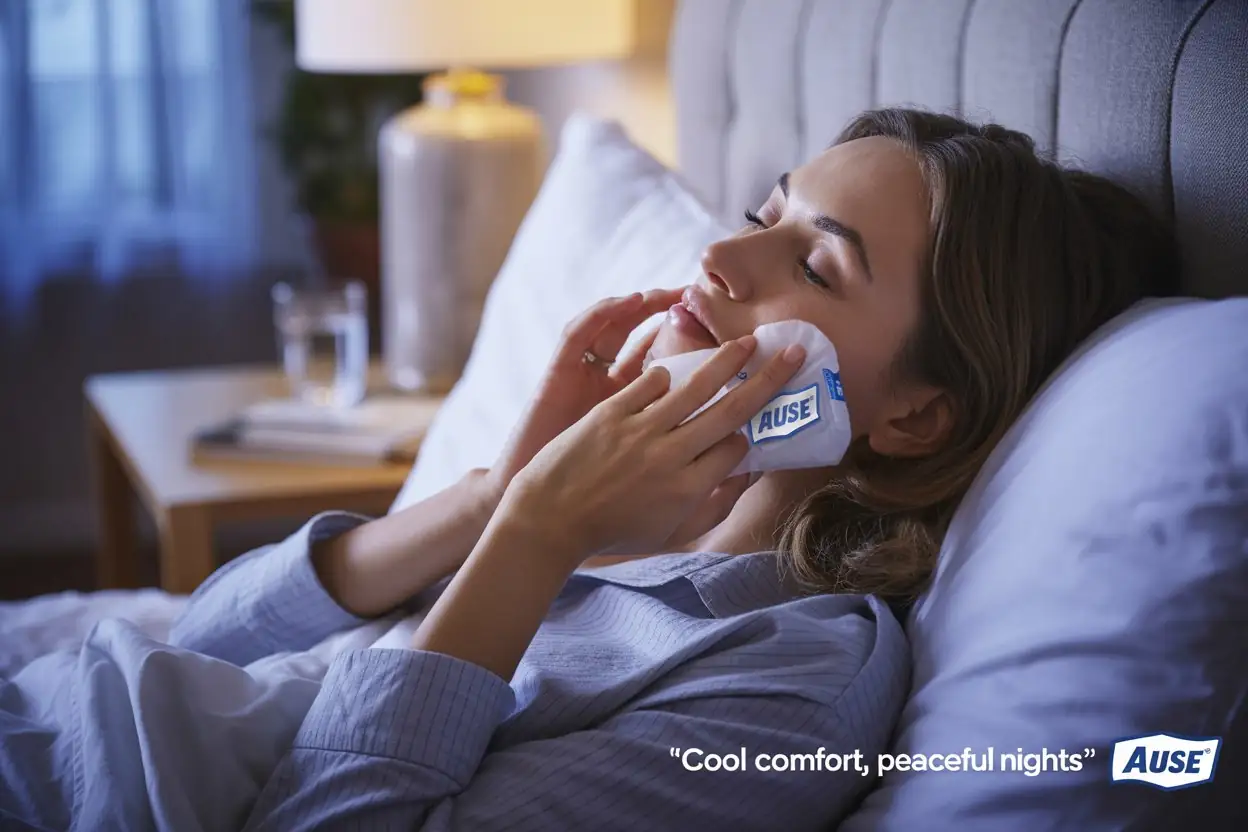
If your jaw is throbbing by bedtime (and let’s be real, it probably is), a cold compress can feel like magic. But timing matters — especially when you’re figuring out how to sleep after wisdom teeth removal without tossing and turning.
Here’s the ideal way to use a cold pack at night:
✅ Cold Therapy Checklist (Evening Edition)
- Use 15–20 minutes on, 15–20 minutes off in the hour before bed
- Always wrap your cold pack in a soft towel — don’t place ice directly on skin
- Apply to both cheeks if both sides were treated
- Switch to warm compresses after 48–72 hours only if advised by your oral care team
- Avoid lying down immediately after — give your body a moment to settle
Cold helps reduce inflammation and dulls the ache around the surgical sites, especially in the first 2–3 nights after tooth extraction. It also helps you feel a bit calmer, like a quiet signal to your brain that it’s time to rest.
VII. Don’t: Eat the Wrong Foods at Night

What you eat before bed matters more than you think, especially when your mouth is full of tender incision sites trying to form clots. The wrong snack or eat spicy food after wisdom teeth removal could irritate the area, cause bleeding, or even start to loosen that fragile blood seal.
Here’s a quick table of nighttime food dos and don’ts:
| ✅ Safe Options | ❌ Avoid These |
| Applesauce | Spicy curries |
| Mashed potatoes | Hot soups |
| Greek yogurt | Crunchy snacks (chips, nuts) |
| Lukewarm soup | Sticky candy or caramel |
| Cold smoothies (no straw) | Anything with seeds or hard edges |
Also — it might be tempting to sneak in a soda or energy drink if you’re feeling drained… but caffeine, sugar, and carbonation can all mess with your ability to fall (and stay) asleep.
🧠 Pro Tip: If you’re unsure what’s safe, stick to soft, cool, and bland — think “baby food but tastier.” And always check with your oral surgeon if something feels risky.
VIII. Do: Create a Calm Sleep Environment

When you’re recovering from wisdom teeth removal, your body’s already in overdrive trying to heal, so even small environmental things (like bright light or background noise) can throw off your sleep cycle.
Here’s how to build a more healing-friendly space:
🛌 Sleep Setup Tips for Oral Surgery Recovery:
- Keep your room cool and dim — helps reduce inflammation and signals your body to relax
- Use a white noise machine or low-volume nature sounds to block out distractions
- Have gauze and water nearby, so you’re not fumbling in the dark if something feels off
- Change your pillowcase daily — it might catch some drool or a bit of post-op fluid
- Switch to breathable bedding — overheating increases post-surgical discomfort
Little things make a big difference when you’re trying to reduce stress hormones and give your oral health time to bounce back.
🧠 Pro Tip: Still feeling restless? Add a drop of lavender oil to your pillow or try 10 deep breaths before lying down. It won’t fix the pain, but it might calm the background tension.
IX. Don’t: Smoke or Drink Before Bed
Look, no judgment — but if you’re smoking or sipping wine the night after wisdom tooth extraction, you’re setting yourself up for healing delays… and possibly worse.
Here’s why it matters:
- Smoking (yes, even nicotine gum) interferes with blood clot formation
- It also increases your chances of getting a dry socket, which is as painful as it sounds
- Alcohol can interact badly with pain medications, or make you bleed more
- Both mess with your natural sleep rhythm, meaning lower quality rest (and longer healing)
It’s tough for some folks, especially if these are part of your usual bedtime habits. But even taking a 3–5 day break can massively reduce your chances of oral infections, bone loss, or healing delays around the incision site.
X. Do: Ask Your Dentist About Sleep Aids (If Needed)
So you’ve tried elevating your head, using cold compresses, and following a good nighttime routine — but you’re still wide awake. What then?
Well, it might be time to talk to your oral surgeon or Murphy dentist about whether a gentle sleep aid is safe during the recovery process.
Here’s a breakdown of common options:
| Sleep Aid | Safe After Wisdom Tooth Removal? | Notes |
| Melatonin | ✅ Usually safe in small doses | Ask your dentist first; avoid high dosages |
| Tylenol PM | ✅ Often recommended | Helps with both pain and sleep |
| Benadryl (Diphenhydramine) | ⚠️ Use caution | Can cause dry mouth, which may slow healing |
| Prescription sedatives | ❌ Not recommended unless specifically approved | May interfere with post-op medications |
If you go this route, be sure to mention all your current meds (especially pain medicines) to avoid risky interactions. Also, avoid anything that causes dry mouth — it can interfere with the blood clotting process at your treatment site.
💬 If you’re unsure, just schedule an appointment or give your dental office a quick call. Even a 5-minute phone consult can save you from a rough night.
XI. Don’t: Sleep With Your Mouth Open (If You Can Help It)
You probably don’t think much about how you breathe how to sleep after wisdom teeth removal, but it’s actually pretty important.
Mouth breathing dries out the delicate surgical site, which slows the healing process and increases the risk of a dry socket. It can also make your mouth feel uncomfortably sticky by morning (not to mention worsen bad breath and inflammation), making it uncomfortable to talk after wisdom teeth removal.
Here are some simple ways to encourage nasal breathing at night:
- Use a humidifier in your bedroom
- Try breathable nasal strips (the kind used for snoring)
- Elevate your head to keep your airways open
- Stay well hydrated throughout the day — dry mouth at night often starts with dehydration
In some cases — especially if you’re congested — you might not be able to avoid sleeping with your mouth open. That’s okay. Just be mindful of the risk, and follow up with your oral care team if it becomes a regular issue.
🧠 Pro Tip: If drooling or dry lips are an issue, keep a towel on your pillow and dab on petroleum jelly before sleep. It won’t fix the open-mouth breathing, but it helps with comfort.
XII. When to Call Your Dentist About Sleep Issues
Okay — not to freak you out, but some post-surgical symptoms aren’t just normal discomfort. If your sleep keeps getting interrupted by dr, or odd sensations in your mouth, it’s time to check in with your oral care team or even schedule an appointment at your dental office.
Here are signs you shouldn’t ignore after wisdom teeth removal, especially if they’re waking you up:
- Bleeding that soaks through gauze repeatedly or lasts more than a few hours
- Severe pain that doesn’t ease with pain relievers
- Swelling that gets worse after 3 days (instead of better)
- Fever, foul taste, or yellow discharge from the incision site
- Throbbing jaw pain that radiates toward your ear or temple could mean a dry socket
- You’re unable to sleep more than 1–2 hours at a time due to discomfort
It might just be the healing process doing its thing, but if anything feels off, don’t wait. Clinics like Springhill Dental Center, Bayview Dental, and Greater Modesto Dental all advise their patients to call if something “feels wrong.”
❓ When is nighttime discomfort normal vs. a complication?
If it’s dull, manageable, and getting better daily, probably normal. If it’s sharp, sudden, or escalating, time to call your oral surgeon.
XIII. Bonus Tips: What People Wish They Knew the First Night
Sometimes the best tips don’t come from the American Dental Association or a fancy guide. They come from the people who were lying there, swollen cheeks, ice pack slipping off, trying to Google “how to sleep after wisdom teeth removal” at 2 a.m.
So here’s a handful of patient-proven gems:
- “Use an extra pillow — trust me. One just isn’t enough.”
- “Sleep with a towel on your pillow for drool. You’ll thank me later.”
- “Set alarms for your pain meds even if you feel okay — it creeps up fast.”
- “Put everything you need (water, meds, gauze, lip balm) right next to your bed.”
- “Don’t assume you’ll sleep through the night. You won’t. And that’s okay.”
And this one’s important: Don’t be hard on yourself. Post-surgical sleep isn’t restful, especially when your face feels like it’s been through a dental procedure. The goal isn’t perfection — it’s small steps toward healing.
Final Thoughts
Getting rest after wisdom teeth removal is key to healing, but it can be tough with swelling, pain, and discomfort. To sleep better, keep your head elevated, stick to a simple bedtime routine, and use cold packs before bed. Avoid spicy or crunchy foods and skip smoking or drinking, as they can slow healing.
If sleep remains difficult, ask your dentist about safe sleep aids. Most importantly, be patient with your recovery — rest may not be perfect, but it’s part of the process. Everyone heals at their own pace, so give yourself time to recover fully. Remember, your body’s doing its job, even if the process feels slow.
Frequently Asked Questions
1. Can I sleep lying flat after wisdom tooth removal?
Not for the first few nights. Sleeping flat can increase swelling and make it easier to dislodge the blood clot at the extraction site. Use pillows or a recliner to keep your head elevated.
2. How long do I need to sleep with my head elevated?
Usually 3–5 nights is enough. Once the swelling and tenderness start to fade, you can slowly return to your normal sleeping position.
3. Is it normal to wake up from pain after surgery?
Yes — especially the first two nights. It’s often a sign your pain medication wore off. That’s why oral surgeons often recommend setting alarms for nighttime doses
4. Can I take melatonin after wisdom teeth removal?
In most cases, yes — but ask your dentist or oral care team first. Melatonin is gentle but can interact with certain pain medicines or sedatives.
5. What position is safest for healing?
Sleeping on your back with your head elevated is ideal. It helps with blood flow, reduces inflammation, and protects your blood clot from pressure.
6. When can I sleep on my side again?
Typically after 5–7 days — once the clotting process is solid and there’s no more bleeding or facial swelling. Still, ease back into it slowly.
7. Is it okay to sleep with gauze in your mouth?
Only if your dentist told you to. Usually, gauze is removed after 30–45 minutes post-surgery. Sleeping with it can cause choking or dry mouth.
8. Should I set alarms to take pain meds at night?
Yes, at least for the first 48 hours. Staying ahead of the pain curve is easier than waking up to sharp jaw pain in the middle of the night.
9. Will sleeping too much slow down recovery?
Nope — rest actually helps healing. Just make sure you’re also following postoperative instructions, keeping your head elevated, and staying hyd
10. How many nights until I can sleep normally?
Most people feel close to normal after 5–7 nights, depending on how many wisdom teeth were removed and how intense the oral surgery was.

